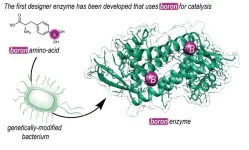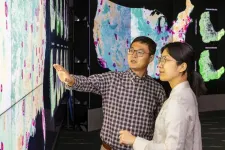(Press-News.org) WASHINGTON, D.C. - Today, the U.S. Department of Energy (DOE) announced $160 million to advance President Biden’s vision to secure the future of American leadership in semiconductor innovation by implementing a key provision in the historic CHIPS and Science Act of 2022 (42 U.S.C. §19331), Microelectronics Research for Energy Innovation. This funding will support the formation of Microelectronics Science Research Centers (MSRCs) focused on energy efficiency and extreme environments.
For decades, advances in microelectronics–the computer chips, sensors, and networks that make high speed communication possible and power everything from smart phones to supercomputers–have been driven by a steady drumbeat of new manufacturing technologies combined with new computing architectures. DOE has a long history of contributing to fundamental innovations in microelectronics technologies that continues today, enabled by a highly–skilled, scientific and engineering workforce and world-leading experimental capabilities. The CHIPS and Science Act of 2022 recognized this leadership and authorized the DOE to establish the MSRCs to expand and focus these efforts to meet the nation’s future needs.
Speaking at a special event alongside the Special Competitive Studies Project AI Expo ’24, Under Secretary for Science and Innovation Geraldine Richmond noted, “One major challenge the explosive growth of artificial intelligence presents is its rapidly growing energy use and the need for major improvements in the energy efficiency of computing. This funding will ensure our labs are all in on the Biden-Harris Administration’s whole of government effort to drive the future of innovation in chips and deliver the highly efficient computing capabilities we need to power frontier AI for many years to come.”
Microelectronics combines many areas of science in complex ways, and a fundamental rethinking is needed to enable continued advances in the field. In addition, the competitiveness of future microelectronics technologies will depend on their ability not only to provide advanced functionality, but also to operate efficiently. Innovations in energy efficiency will be crucial to meet future needs and to meet the Biden-Harris administration’s goal of decarbonization by 2050. For DOE’s science and technology mission, it is also true that advances are needed not only for microelectronics generally, but also specifically for microelectronics designed to operate in extreme environments, including high-radiation, cryogenic, and high magnetic field environments.
This funding opportunity is requesting proposals for fundamental scientific research in the following four research areas:
New or improved materials, surface processing and control, chemistry, synthesis, and fabrication
Advanced computing paradigms and architectures
Integrated sensing, edge computing, and communication
Processing in extreme environments, radiation, radiation transport, and materials interaction
Applications are open to DOE national laboratories. Other institutions can be proposed as subcontractors on proposals led by DOE national laboratories. Total planned funding is up to $160 million over four years, with $40 million in Fiscal Year 2024 dollars and outyear funding contingent on congressional appropriations.
The Laboratory Announcement, sponsored by the DOE’s Office of Science, can be found on the Funding Opportunities webpage.
END
Department of Energy announces $160 million for research to form microelectronics science research centers
Research will focus on microelectronics for energy efficiency and extreme environments
2024-05-08
ELSE PRESS RELEASES FROM THIS DATE:
Federico Rosei: international recognition for a researcher at the forefront of his field
2024-05-08
INRS professor recognized for international research and mentoring efforts in nanotechnology.
Federico Rosei, a professor at the Institut national de la recherche scientifique (INRS) in materials science and nanotechnology, has been appointed Materials Research Society (MRS) Fellow 2024 for “his leadership in the nanomaterials synthesis and characterization and his sustained international efforts in service, mentoring and outreach in the field.”
He thus becomes the first researcher in Quebec and the third ...
University of Groningen chemists produce new-to-nature enzyme containing boron
2024-05-08
Boronic acid has been used in organic chemistry for decades, even though it is not present in any organism. ‘It gives rise to different chemical reactions than those we find in nature,’ explains Gerard Roelfes, Professor of Biomolecular Chemistry & Catalysis at the University of Groningen. His group created an enzyme with boronic acid at its reactive centre and then used directed evolution to make it more selective and to improve its catalytic power. Furthermore, enzymatic reactions are more sustainable than classical chemical reactions, as they take place at low temperatures and without toxic solvents. The study was presented online in the journal ...
Study led by ORNL informs climate resilience strategies in urban, rural areas
2024-05-08
Local decision-makers looking for ways to reduce the impact of heat waves on their communities have a valuable new capability at their disposal: a new study on vegetation resilience.
Scientists at the Department of Energy’s Oak Ridge National Laboratory completed a study of how well vegetation survived extreme heat events in both urban and rural communities across the country in recent years. The analysis informs pathways for climate mitigation, including ways to reduce the effect of urban heat islands.
Vegetation such as trees provide a valuable cooling effect, shading surfaces and deflecting solar radiation while releasing ...
Save the Date: American College of Surgeons Clinical Congress in San Francisco, October 19-22
2024-05-08
CHICAGO – The American College of Surgeons (ACS) Clinical Congress 2024 will take place Saturday, October 19, through Tuesday, October 22, in San Francisco and will feature opportunities for members of the media to learn about the latest evidence-based practices and research in surgery and healthcare.
This year’s Clinical Congress will once again be a hybrid event, allowing reporters to cover the conference onsite or virtually.
Clinical Congress is one of the world’s largest educational meetings for surgeons, ...
Gerry Rubin receives the 2024 Gruber Neuroscience Prize
2024-05-08
Janelia Senior Group Leader Gerry Rubin and Cori Bargmann of The Rockefeller University have been jointly awarded the 2024 Gruber Neuroscience Prize for their pioneering work in elucidating the organization of neural circuits in behavior and developing new genetic tools to advance the field of neuroscience.
The Gruber Neuroscience Prize, established in 2004, honors scientists for major discoveries that have advanced the understanding of the nervous system. The prize is part of the Gruber International Prize Program, hosted by the Gruber Foundation, which honors individuals in the fields of ...
Pore pressure diffusion led to microseismicity at Illinois basin carbon sequestration site
2024-05-08
Pore pressure diffusion generated by carbon dioxide injected underground at a carbon storage site in the Illinois Basin is the likely cause of hundreds of microearthquakes that took place at the site between 2011 and 2012, according to a new analysis.
The modeling study published in the Bulletin of the Seismological Society of America indicates that pressure diffusion along existing faults into the basement rock could have destabilized the faults where the microseismicity—ranging from Mw -2 to 1—occurred, said Ruben Juanes of MIT and colleagues.
There are some similarities between CO2 injection and wastewater injection from oil and gas operations, although globally the ...
New study finds AI-generated empathy has its limits
2024-05-08
ITHACA, N.Y. – Conversational agents (CAs) such as Alexa and Siri are designed to answer questions, offer suggestions – and even display empathy. However, new research finds they do poorly compared to humans when interpreting and exploring a user’s experience.
CAs are powered by large language models (LLMs) that ingest massive amounts of human-produced data, and thus can be prone to the same biases as the humans from which the information comes.
Researchers from Cornell University, Olin College and Stanford University tested this theory ...
NASA’s Webb hints at possible atmosphere surrounding rocky exoplanet
2024-05-08
Researchers using NASA’s James Webb Space Telescope may have detected atmospheric gases surrounding 55 Cancri e, a hot rocky exoplanet 41 light-years from Earth. This is the best evidence to date for the existence of any rocky planet atmosphere outside our solar system.
Renyu Hu from NASA’s Jet Propulsion Laboratory (JPL) in Pasadena, California, is lead author on a paper published today in Nature. “Webb is pushing the frontiers of exoplanet characterization to rocky planets,” Hu said. “It is truly ...
A tailored vaccine could one day treat eczema in children -- new research
2024-05-08
New research from a multi-disciplinary team at Trinity College Dublin suggests a “tailored vaccine” might hold the key to treating bacteria-driven flares of eczema in children.
The team has taken several leaps forward in understanding how the immune response works in cases of eczema driven by the common, troublesome Staphylococcus aureus bacterium, and in doing so they have identified new cellular targets for a vaccine.
Eczema, also known as atopic dermatitis, affects up to one in four children in Ireland. Common symptoms include itchy, dry skin, and – when bacteria are involved – weeping wounds that can ...
MD Anderson Research Highlights for May 8, 2024
2024-05-08
HOUSTON ― The University of Texas MD Anderson Cancer Center’s Research Highlights showcases the latest breakthroughs in cancer care, research and prevention. These advances are made possible through seamless collaboration between MD Anderson’s world-leading clinicians and scientists, bringing discoveries from the lab to the clinic and back.
Recent developments at MD Anderson offer insights into expanding the use of FGFR inhibitors, maintaining radiation therapy as standard of care for locally recurrent endometrial cancer, an antibody-drug ...
LAST 30 PRESS RELEASES:
COVID-19 vaccination during pregnancy may help prevent preeclampsia
Menopausal hormone therapy not linked to increased risk of death
Chronic shortage of family doctors in England, reveals BMJ analysis
Booster jabs reduce the risks of COVID-19 deaths, study finds
Screening increases survival rate for stage IV breast cancer by 60%
ACC announces inaugural fellow for the Thad and Gerry Waites Rural Cardiovascular Research Fellowship
University of Oklahoma researchers develop durable hybrid materials for faster radiation detection
Medicaid disenrollment spikes at age 19, study finds
Turning agricultural waste into advanced materials: Review highlights how torrefaction could power a sustainable carbon future
New study warns emerging pollutants in livestock and aquaculture waste may threaten ecosystems and public health
Integrated rice–aquatic farming systems may hold the key to smarter nitrogen use and lower agricultural emissions
Hope for global banana farming in genetic discovery
Mirror image pheromones help beetles swipe right
Prenatal lead exposure related to worse cognitive function in adults
Research alert: Understanding substance use across the full spectrum of sexual identity
Pekingese, Shih Tzu and Staffordshire Bull Terrier among twelve dog breeds at risk of serious breathing condition
Selected dog breeds with most breathing trouble identified in new study
Interplay of class and gender may influence social judgments differently between cultures
Pollen counts can be predicted by machine learning models using meteorological data with more than 80% accuracy even a week ahead, for both grass and birch tree pollen, which could be key in effective
Rewriting our understanding of early hominin dispersal to Eurasia
Rising simultaneous wildfire risk compromises international firefighting efforts
Honey bee "dance floors" can be accurately located with a new method, mapping where in the hive forager bees perform waggle dances to signal the location of pollen and nectar for their nestmates
Exercise and nutritional drinks can reduce the need for care in dementia
Michelson Medical Research Foundation awards $750,000 to rising immunology leaders
SfN announces Early Career Policy Ambassadors Class of 2026
Spiritual practices strongly associated with reduced risk for hazardous alcohol and drug use
Novel vaccine protects against C. diff disease and recurrence
An “electrical” circadian clock balances growth between shoots and roots
Largest study of rare skin cancer in Mexican patients shows its more complex than previously thought
Colonists dredged away Sydney’s natural oyster reefs. Now science knows how best to restore them.
[Press-News.org] Department of Energy announces $160 million for research to form microelectronics science research centersResearch will focus on microelectronics for energy efficiency and extreme environments



